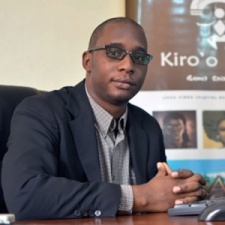“Africa has the youngest demography on earth and our smartphone and internet penetration is on the rise,” Olivier Madiba, founder and CEO of Kiro'o Games in Cameroon, told us. “There is a huge opportunity to invest in African gaming studios now to take the driver’s seat of a 500 million-user market by 2030.”
Africa and in particular Cameroon was one of the markets that fell under the PG Connects microscope at last year’s Digital conference. Olivier Madiba joined a panel of publishers and developers from around the world (including studio Maliyo based in Nigeria, Flyer One Ventures which focuses on Central and Eastern Europe, and Stillfront based in Sweden but with studios all over the world) to discuss regional opportunities and challenges.
You can watch the video recording of the full panel here. But we also asked the Kiro'o Games boss for further insight into the perception of the games industry in Cameroon and for his thoughts on the opportunities for developers in Africa. That Q&A is below.
PocketGamer.biz: What are you currently working on?
Olivier Madiba: At Kiroo Games we are working to optimize our first mobile game Aurion Kajuta Gems Fighter with multiplayer and a play-to-earn model.
But our biggest work is that we are building the first African0themed sim game, The Elite Of Mboa.
What advice do you have for people wanting to invest, or sell games, in your region? How does somebody go about finding new business partners and opportunities there if they are not based there?
My advice for investors: if you want to win here, you will have to change your paradigm.
Fantasy RPGs will not work for the African audience because a lot of them didn’t have fairytales when they were kidsOlivier Madiba, Kiro'o Games
You are used to investment being like Formula 1 in the Western ecosystem, but Africa is more like a Paris-Dakar race. It’s not how fast you can go, but how fast you can adapt again and again.
Also, I would tell people that the real African gaming market is something that has to be mined and not picked up. The data that investors can see on Western aggregators are just partial and biased views of what’s possible. I am planning to make a paper about that point in 2022.
Do games from one part of the world have a distinct character and tone? Is there a specific quality or theme to games that are successful in Africa?
From what we see in our social studies of the African players, a lot of games work when they find compatible behaviours in the culture of the target.
For example, RPGs and fantasy games will not work for the young adult African audience because a lot of them didn’t have fairytales before bed when they were kids.
We think the most successful games in African Audiences will be simulations of real life which provide fun.
How much do politics and current affairs affect the games industry in a region?
Politicians here don’t have a problem with video games, but the internet infrastructures can slow down the adoption and updates of games.
We also know that some very rare countries want to charge developers to make games using national symbols.
Anybody around the world can be a developer these days. So is the barrier to entry lower than ever – or does it just mean you’re competing with more people than ever?
Everyone can make a game today, that’s also why marketing has become 70% of the challenge. You have to make your game visible and downloaded by the public.
It’s also very hard for a beginner’s studio to think about all the business aspects of their game before launching it. I will say technically the entry barrier is lower, but in terms of marketing, it’s more competitive than ever.
If you want to win here, change your paradigm. It’s not how fast you can go, but how fast you can adaptOlivier Madiba, Kiro'o Games
What is the perception of “game developer” as a career in your region? Is the games industry growing in respect, with each generation?
For now, there is a really low number of children aware that game development exists in our region. But when a kid realizes it, they want to make it! What we try to do is show them the reality of all the hard work beyond the passion.
Gaming is an elite place; it will be hard to get two million jobs in gaming in a country one day. But gaming can be used to fund other businesses, that’s our vision in Kiroo at least.
What other regions in the world are you watching closely at the moment? Which up-and-coming markets should our audience be mindful of?
I have some interest in the South American market where great things are happening as well as the North African market.
A big thanks to Olivier Madiba for the insight into Cameroon and Africa. Panel discussions about global trends are an important part of all our industry events and you can find where the latest one is taking place at www.pgconnects.com and you can watch conference talks that you missed at www.videovault.biz.






















